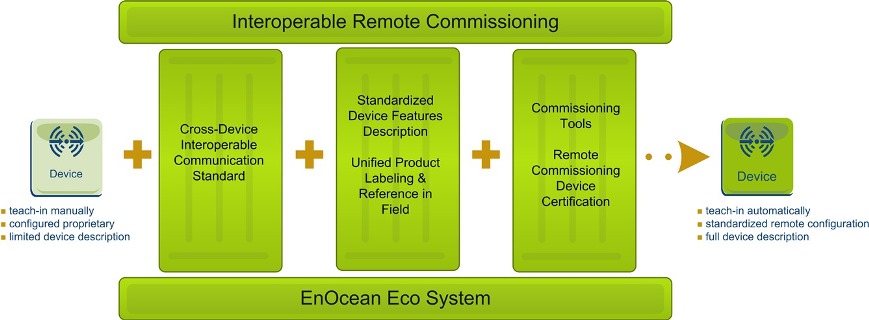Remote commissioning defines the communication between the commissioned and the target device.
 Marian
Hönsch,
Marian
Hönsch,Remote Commissioning Team Leader, Technical Working Group,
EnOcean Alliance
|
June 2014 |
[an error occurred while processing this directive] |
|
Intelligent Commissioning for Smart Buildings
Remote commissioning defines the communication between the commissioned and the target device.
|
 Marian
Hönsch, Marian
Hönsch,Remote Commissioning Team Leader, Technical Working Group, EnOcean Alliance |
The EnOcean
Alliance defined a standardized process to pave the way for
remote commissioning of EnOcean-based devices in building automation
networks. This enables installers and system integrators to remotely
connect batteryless wireless devices using a central tool. At the same
time, the specification allows complete documentation of existing
networks and offers therefore a comfortable and practicable way to
expand or change installations. This brings interoperability in
building automation to the next level.
| Articles |
| Interviews |
| Releases |
| New Products |
| Reviews |
| [an error occurred while processing this directive] |
| Editorial |
| Events |
| Sponsors |
| Site Search |
| Newsletters |
| [an error occurred while processing this directive] |
| Archives |
| Past Issues |
| Home |
| Editors |
| eDucation |
| [an error occurred while processing this directive] |
| Training |
| Links |
| Software |
| Subscribe |
| [an error occurred while processing this directive] |
Energy harvesting wireless solutions capture more and more application fields in a building system. This also breaks down the boundaries between individual disciplines, crossing separate areas to an intelligent overall system. That’s what today’s expectations towards building automation are. But these expectations put new challenges to system integrators and installers as they make a system’s planning, implementation and operation more complex.
In regard to this development, the Technical Working Group (TWG) of the
EnOcean Alliance has developed a complete process for remote
commissioning that includes initial set-up, parameterization, control,
maintenance and documentation of batteryless wireless devices. The
target is to define a uniform approach for all of the listed procedures
as a next level of interoperability.
Common rules
Remote
commissioning defines the communication between the commissioned
and the target device. Basis for this is the specification of an
interoperable interface that product manufacturers can integrate in
their devices. It adds to the existing standardized profiles and offers
an enhanced interoperability by defining abstract structure of the
commands and basic rules for remote access, configuration and a uniform
procedure of parameterizing EnOcean-based devices in the field. The
communication is based on Generic Profiles data description language,
the grammatical rules for all options of data encoding for ultra-low
power and energy harvesting radio communication. These also specify how
a managing device, a smart phone for example, talks with the target
device.
Consistent device description
In
addition to the commissioning process, the TWG has introduced a
standardized file for device description that describes the device and
its functionalities in detail in a pre-defined electronic data sheet.
It comes along with a uniform device labeling which is composed of the
EnOcean ID (communication basis) and the product ID (reference to
manufacturers’ specific end-application). All this information will be
available on a central data base. Installers or system operators can
use a device’s ID to find the detailed electronic data sheet. That way,
they have immediate access to all specifics of the product including
the application profiles in use (EnOcean Equipment Profiles, EEP),
operational modes and the requirements of parameterization. This
significantly eases set-up and maintenance of an EnOcean network.
The
specification has an open character so that manufacturers and
service providers can develop several tools such as apps and web
interfaces that include all functionalities of the remote
commissioning. This will provide installers and system operators with
user-friendly solutions to configure, control and maintain
automation systems.
One specification for several tasks
The standardized interface and processes of remote commissioning are intended to further optimize the control and configuration of building automation networks by using software that automates the support for EnOcean-based devices.
All
together, remote commissioning has the following tasks:

The
remote commissioning process is based on the EnOcean Alliance’s strong
eco-system of more than 1,200 products and consists of the three
pillars interoperable communication standard, standardized feature
description including unified product labeling and commissioning tools.
Different use case scenarios
The
functionalities of remote commissioning provide benefits in several
scenarios. First of all, it helps to centralize and record the teach-in
process. This not only eases the implementation and network of energy
harvesting wireless devices. It also enables system planners to
reproduce the implementation at any time, even after years. That way,
they can adapt the process or change it for new devices or when the
network structure needs to be changed. When a new network is installed,
all parameterization can be done by one central commissioning tool. The
user just needs to scan the device and transmit this information to the
actuator. All necessary information including IDs and functionalities
are transformed with one single step and stored centrally for
configuration purposes.
Adjustments of an existing network
In
an already installed network, the existing devices can be
commissioned afterwards. This is particularly interesting for areas
where rooms have a similar design, as in a hotel for example. Here the
same commissioning procedure can be repeated several times for
different target devices. Another scenario is the change of control
parameters of intelligent actuators, for example thresholds and timers
in local HVAC equipment or if the room structure in office buildings is
changed. The complete process of re-configuration can be done during
operation via remote control without touching a single device.
Nevertheless, this might affect the configuration of the application or
of the entire system, which can also be done with the remote
commissioning tool.
Service and maintenance
[an error occurred while processing this directive]The
comprehensive documentation as a vital part of the remote
commissioning process can also be used to set up a comprehensive
monitoring application to visualize and actively control a live
network. For this, visualization tools give an overview of the
documented system structure (plans, drawings, descriptions, tables
etc.) that, for example, allows users to identify and solve potential
problems in operation. The same functionality can also help to
determine malfunctions and the affected devices very quickly. In
addition, the specifics of remote commissioning also ease the
replacement of the non-functioning device. For a smooth replacement
process, the new device should support the same application profiles
(EEP) as the previous one. Installers can find this information in the
product labeling, which they can access in the central data base.
Besides this, the application configuration needs to be restored in the
new hardware. In this case, the new device can be commissioned in
accordance with the documented and previously stored link tables and
application configuration of the old device. This guarantees a seamless
product change without any system failure.
With
remote commissioning, the EnOcean Alliance has defined a new
standard for the set-up and operation of intelligently automated
buildings. This significantly eases the work of planners, installers
and system integrators. At the same time, it strengthens the
interoperability of EnOcean-based devices as the installer doesn’t need
to deal with the specifics of a device anymore. As of now,
manufacturers can integrate the standardized specification in their
devices and develop tools for central control, configuration and
troubleshooting – bringing the intelligence of a smart building to the
next level.
About the Author
Marian
Hönsch is Product Manager and Software Architect at EnOcean. In
this position, he is responsible for EnOcean software products and
security concepts. In the EnOcean Alliance, he actively contributes to
the Technical Working Group, where he leads the Remote Commissioning
and Generic Profiles team. In addition, he is a member of the
Alliance’s EEP Approval Committee. Marian holds a Bachelor's in
Informatics and a Master of Science magna cum laude in Software
Engineering.
[an error occurred while processing this directive]
[Click Banner To Learn More]
[Home Page] [The Automator] [About] [Subscribe ] [Contact Us]